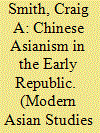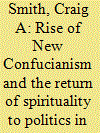| Srl | Item |
| 1 |
ID:
164886


|
|
|
|
|
| Summary/Abstract |
Until recent decades, historians of modern East Asia generally considered Asianism to be an imperialistic ideology of militant Japan. Although Japanese expansionists certainly used the term and its concept in this way in the 1930s and 1940s, earlier proponents of Asianism looked upon it as a very real strategy of uniting Asian nations to defend against Western imperialism. Showing that Chinese intellectuals considered different forms of Asianism as viable alternatives in the early days of the Republic of China, this article examines a number of discussions of Asianism immediately following the 1911 Revolution. Concentrating on newspaper articles and speeches by intellectuals Ye Chucang and Sun Yat-sen, I show the international aspirations of the Guomindang elite at this crucial point in the construction of the Chinese nation. Despite the dominance of discourse on the nation state, these intellectuals advocated different Asianist programmes for strategic purposes within the first two years of the Republic, dependent on their very different relationships with Japan.
|
|
|
|
|
|
|
|
|
|
|
|
|
|
|
|
| 2 |
ID:
160506


|
|
|
|
|
| Summary/Abstract |
In the past two decades, the revival of New Confucianism in mainland China has accelerated and become a crucial component of the intellectual public sphere. New Confucians have appeared alongside the larger groups of liberals and the New Left, often developing in dialogue or contrast with these intellectual neighbours. As part of the series of research dialogues on mapping the intellectual public sphere in China, this article examines recent discourse from New Confucian intellectuals, particularly dialogue with liberals and the New Left, to highlight the major debates and leading figures that define the cultural nationalist movement of Mainland New Confucianism. We show that, despite the immense difficulty of finding power as a minority voice in contemporary China, an integration of the religious and political dimensions of Confucianism in mainstream Chinese social, political, and intellectual culture remains the primary ideal that fuels and unites these intellectuals in the 2010s.
|
|
|
|
|
|
|
|
|
|
|
|
|
|
|
|